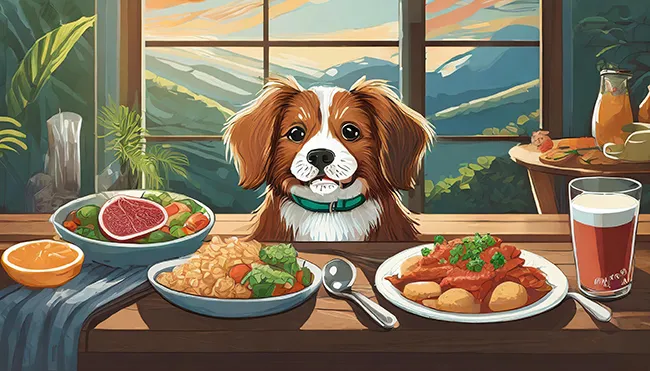
When it comes to feeding your dog human foods, it’s really a mix of good and bad. Some foods we eat can be great for your dog, but others can be dangerous. Some things we eat are beneficial to our dogs, while others are dangerous. It is possible to accidentally give your dog something toxic without realizing it. In actuality, over 401,500 pets in the United States suffer from poisoning each year, and food poisoning accounts for a sizable portion of those cases.
So what should you do? It is critical to understand which human foods are safe for dogs and which are not. This tutorial is here to help you figure it out. Consider it a handy guide for avoiding incorrect foods and keeping your dog healthy. Let us make things simple and safe for your precious pet.
Read More: Can Dogs Eat
Table of Contents
- Toxic Treats: A Comprehensive List of Foods to Avoid
- 1. Chocolate
- 2. Grapes and Raisins
- 3. Onions and Garlic
- 4. Xylitol-containing Products
- 5. Alcohol
- 6. Caffeinated Beverages
- 7. Avocados
- 8. Dairy Products
- 9. Certain Nuts, Especially Macadamia Nuts
- 10. Bones and Fat Trimmings
- 11. Citrus Fruits
- 12. Apple, Apricot, Cherry, & Plum Seeds/Pits
- 13. Broccoli
- 14. Chicken & Turkey Skin, Ham, & Other Fatty Cuts of Meat
- 15. Mushrooms
- 16. Nutmeg & Cinnamon
- 17. Salt
- 18. Spicy Food
- 19. Tomatoes & Raw Potatoes
- 20. Tobacco
- 21. Yeast & Raw Dough
- 22. Raw Meat
- Conclusion
Toxic Treats: A Comprehensive List of Foods to Avoid
Dogs have different metabolic processes than humans, making some foods toxic to them. Here’s a list of common foods that should never be fed to dogs:
1. Chocolate

Chocolate toxicity in dogs is primarily due to theobromine and caffeine. Dogs metabolize theobromine much more slowly than humans, allowing toxic levels to build up in their system. This can lead to symptoms ranging from mild (such as vomiting and diarrhea) to severe (including seizures and cardiac arrest). The severity of symptoms often depends on the amount and type of chocolate consumed, with darker chocolates being more dangerous.
2. Grapes and Raisins

The toxic substance in grapes and raisins that causes kidney failure in dogs remains unidentified, but the effects are well-documented. Even small amounts can be extremely harmful, leading to sudden kidney failure. Symptoms include vomiting, lethargy, and dehydration, and can escalate to kidney failure within a short period.
3. Onions and Garlic
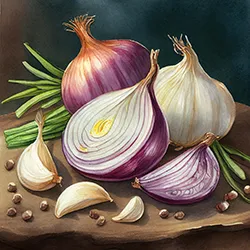
Onions and garlic contain thiosulfates, which can cause oxidative damage to red blood cells, leading to their breakdown. This condition, known as hemolytic anemia, can result in weakness, lethargy, and sometimes collapse. The toxicity can occur from both raw and cooked forms, and even small doses can be harmful if ingested regularly.
4. Xylitol-containing Products

Xylitol, a sugar alcohol found in many sugar-free products, can cause insulin release in dogs, leading to hypoglycemia (low blood sugar). This can happen very quickly after ingestion and can be life-threatening, causing symptoms like vomiting, weakness, lack of coordination, seizures, and even liver failure.
5. Alcohol

Dogs are much more sensitive to alcohol than humans, and even small amounts can lead to ethanol poisoning. This can affect the nervous system, causing symptoms like vomiting, disorientation, loss of coordination, and in severe cases, coma or death.
6. Caffeinated Beverages

Caffeine, like in coffee or tea, can overstimulate a dog’s nervous system, leading to restlessness, rapid breathing, heart palpitations, and muscle tremors. In large amounts, caffeine can be fatal to dogs.
Here’s a list of caffeinated beverages that are unsafe for dogs:
- Coffee (including brewed, espresso, and even coffee grounds)
- Tea (black, green, white, and other teas containing caffeine)
- Soda (especially colas and energy drinks)
- Energy drinks (all varieties)
- Some flavored waters (those containing caffeine)
- Pre-workout supplements (liquid forms)
- Iced teas
- Certain herbal drinks (that contain guarana or other caffeinated herbs)
It’s important for dog owners to keep these beverages out of reach of their pets to prevent accidental ingestion.
7. Avocados

Avocados pose certain risks to dogs primarily due to two factors: the presence of persin and the physical danger of the pit. Persin is a substance found in avocados that acts as a fungicide in the plant. While it’s relatively harmless to humans, it can cause health issues in dogs such as vomiting and diarrhea. The symptoms might not be severe in all cases, but they are a cause for concern.
The larger risk comes from the avocado pit, which is a choking hazard and can also lead to intestinal blockage if swallowed. This can be a serious, potentially life-threatening condition requiring veterinary intervention. Therefore, while the flesh of the avocado in small amounts might not pose a significant risk, it’s generally advised to avoid feeding avocados to dogs, especially to prevent access to the pit.
8. Dairy Products

Dairy products, including milk, cheese, ice cream, and yogurt, can cause digestive issues in dogs due to lactose intolerance. Many dogs do not produce enough lactase, the enzyme required to properly digest lactose, which is the sugar found in milk. When lactose-intolerant dogs consume dairy, they may experience gastrointestinal upset manifesting as symptoms like diarrhea, vomiting, and gas. While small amounts of certain dairy products might be tolerated by some dogs, it’s generally best to avoid giving them dairy to prevent discomfort and digestive problems.
9. Certain Nuts, Especially Macadamia Nuts

Macadamia nuts are known to be toxic to dogs, though the exact compound causing toxicity is unknown. Symptoms of poisoning include vomiting, weakness, hyperthermia, tremors, and lethargy. Other nuts, like almonds, may not be toxic but can pose risks like choking or gastrointestinal obstruction.
10. Bones and Fat Trimmings

Cooked bones can splinter and cause obstructions or lacerations in the digestive tract. Fat trimmings, on the other hand, can lead to pancreatitis, a serious and painful condition characterized by an inflamed pancreas.
11. Citrus Fruits
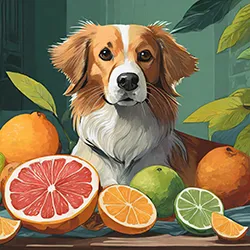
Citrus fruits, in general, can be problematic for dogs, especially if consumed in large amounts. The essential oils and citric acid found in citrus can cause irritation and potentially lead to more serious health issues like central nervous system depression if ingested in significant quantities. Here’s a list of citrus fruits that are commonly considered unsafe for dogs:
- Lemons: Both the fruit and the peel can cause upset stomachs in dogs.
- Limes: Like lemons, limes contain substances that are toxic to dogs.
- Grapefruits: Their high acidity and essential oils can lead to gastrointestinal upset.
- Oranges: Small amounts of the flesh might not harm your dog, but the peel, seeds, and leaves can be toxic.
- Tangerines: Similar to oranges, small amounts of the flesh could be okay, but the peels and seeds should be avoided.
- Pomelos: Due to their similarity to grapefruits and oranges, pomelos can also cause digestive issues.
- Bergamots: Known for their strong scent and flavor, bergamots are particularly high in toxic compounds for dogs.
12. Apple, Apricot, Cherry, & Plum Seeds/Pits
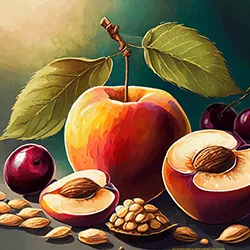
These fruit seeds and pits contain cyanogenic glycosides, which can release cyanide when metabolized. Cyanide is a potent chemical that can inhibit the ability of a dog’s blood cells to carry oxygen, leading to oxygen deprivation. Symptoms of cyanide poisoning include vomiting, difficulty breathing, and in severe cases, seizures and coma.
13. Broccoli
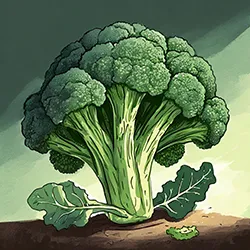
Broccoli is generally safe in very small quantities, but it contains isothiocyanates, which can cause gastrointestinal irritation in dogs. In large enough amounts, it can lead to severe gastric irritation, diarrhea, and even bleeding from the stomach. The stalks pose an additional risk as they can cause obstruction in the throat or intestines.
14. Chicken & Turkey Skin, Ham, & Other Fatty Cuts of Meat

These foods are rich in fat and can be difficult for dogs to digest, leading to pancreatitis, an inflammation of the pancreas. Symptoms of pancreatitis include vomiting, stomach pain, and diarrhea. It can be a life-threatening condition requiring immediate veterinary care.
15. Mushrooms

While some mushrooms are safe, others contain toxins that can be deadly. Toxic mushrooms can cause a range of symptoms from vomiting and diarrhea to liver and kidney damage, seizures, and coma. It’s difficult for non-experts to distinguish between safe and toxic mushrooms, so it’s best to avoid them altogether.
16. Nutmeg & Cinnamon

Nutmeg contains myristicin, a compound that can cause hallucinations, high heart rate, vomiting, and seizures in dogs. Cinnamon isn’t toxic but can cause irritation to the mouth and digestive system, leading to discomfort, coughing, and choking.
17. Salt

Consuming large amounts of salt can lead to sodium ion poisoning in dogs, which can cause symptoms like vomiting, diarrhea, excessive thirst, urination, lethargy, tremors, seizures, and even death. Foods high in salt, like chips or pretzels, should be avoided.
18. Spicy Food
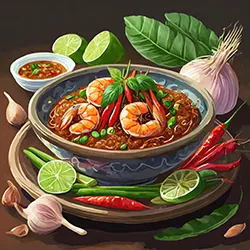
Spicy foods can cause significant gastrointestinal upset in dogs, including vomiting and diarrhea. They can also lead to more severe conditions like pancreatitis. Additionally, spices themselves may contain substances toxic to dogs.
19. Tomatoes & Raw Potatoes

Both contain solanine, a toxin that is more concentrated in the green parts of the plant. In dogs, solanine can cause gastrointestinal distress, lethargy, weakness, and confusion. While ripe tomatoes and cooked potatoes are less risky, it’s important to avoid the green parts and raw potatoes altogether.
20. Tobacco

Nicotine is highly toxic to dogs, with poisoning symptoms including drooling, nausea, vomiting, high heart rate, tremors, seizures, and potentially death. Even small amounts of tobacco products can be dangerous.
21. Yeast & Raw Dough

The yeast in raw dough can ferment in a dog’s stomach, producing alcohol that can lead to alcohol poisoning. Additionally, the dough can expand, causing bloating, severe stomach pain, and potentially life-threatening conditions like gastric dilatation-volvulus (GDV) or “bloat.”
22. Raw Meat
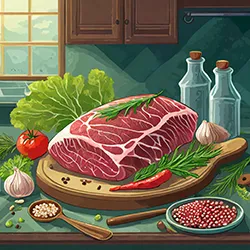
Raw meat can contain pathogens like Salmonella and E. coli, which can cause food poisoning in dogs. Symptoms include vomiting, diarrhea, and fever. Additionally, bones in raw meat can be a choking hazard and cause obstructions or tears in the digestive tract.
Understanding the specific risks associated with these foods can help dog owners make safer dietary choices for their pets, ensuring their well-being and avoiding potential health hazards.
Conclusion
Understanding and avoiding these toxic foods can play a crucial role in maintaining your dog’s health and happiness. Always err on the side of caution and consult with a veterinarian if you’re unsure about feeding certain foods to your dog. By keeping these dangerous items out of reach, you can help ensure your canine companion enjoys a safe and nutritious diet.



